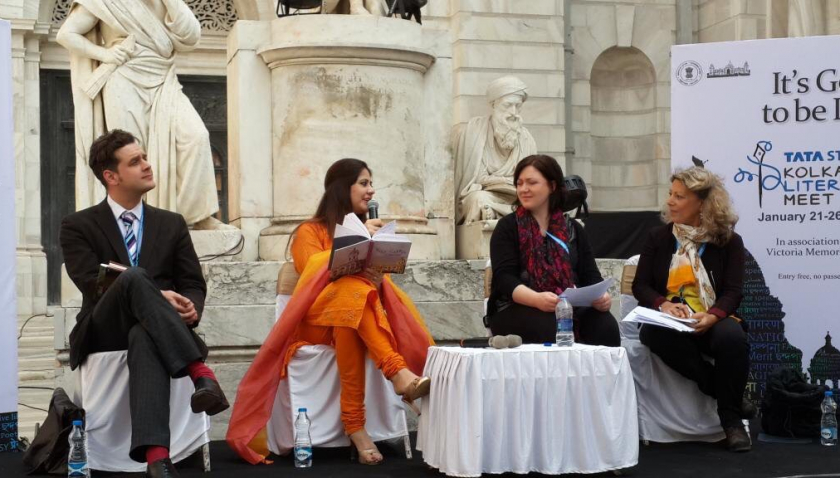After returning from India on the 30th January I have finally been able to begin to process my incredible experiences in Jaipur, Kolkata and Malda; all very different and diverse places with their very own vibe and all of them in their own way beautiful and deeply affecting to me as a writer. I found two events in particular will stay with me through the rest of my life, and felt vital to my practice as a writer and also just as a human being.
At the British Council offices in Kolkata, I led a session for some of the pupils from Future Hope School, and this to me was incredibly rewarding. Each of the students really welcomed me and embraced the brief presented to them in the workshop, all asking interesting questions and each working on a unique, thought provoking poem. Even the unsure or shy students in the group worked on their poems enthusiastically and each student wanted to share their work with me, which was heartening and encouraging for me, too, as I don’t usually work with children and had been, perhaps, a little nervous about the challenge!
At the end of the session many of the students read their work out to the group, or stood with me and let me read the poem out, and the audience thoroughly enjoyed being able to share the various ideas, themes and emotions explored in one another’s work. Some of the students wrote funny, heart-warming poems, with an emphasis on writing about feelings of joy, hope and happiness, and some wrote altogether more complex and sad poems, and what I wanted to say to these children was that whatever they wanted to write about, and however they wanted to explore it, was valid and might be useful to them in a variety of ways, to think about and work through emotions and experiences.
When my group and my friend and fellow poet, Luke Kennard’s group merged into one group, the students from Future Hope read some of their poems out to a group of children they’d never met before, and I felt an enormous sense of pride and found the working with the students an incredibly humbling experience. These children have come from very difficult backgrounds and have been given opportunities that they wholeheartedly embrace and grab hold of, and I really enjoyed sharing poems with them as it was poetry that helped me get through difficult experiences when I was their age. I truly hope I get to meet the children again and would love to visit their school.
At the Kolkata Lit Meet I met the philosopher Barbara Cassin, and Luke Kennard, Saira Shah Halim and I engaged in an interesting panel discussion at the stunningly beautiful Victoria Memorial. I was humbled and excited to meet Barbara in particular, and enjoyed hearing her read in French, and tried hard to follow her words by reading them on the page! We discussed how philosophy and poetry can help us in times of anguish, and although at times it was a difficult and perplexing discussion I really believe that’s what I most enjoyed about it. It’s more important, to me, that difficult subjects are explored falteringly, perhaps, and investigated in a very open, in-the-moment way and processed later, than reading from a script and having responses already set out – I think, or I hope, each of us learned a little from one another, and I really enjoyed attending this session with Luke as we have such a great connection as poets and have similar interests and ideas that we thoroughly enjoyed talking about both during the session and beyond.
I was thrilled by Kolkata, and the generosity of all the people I met and worked with across all the venues and cities I visited. I learned so much about India and its traditions, values, difficulties, and its immense contribution to world culture. Speaking with so many people I realised that, as with any and every place in the world, the people of India are up against issues we all face collectively and individually, and in particular I spoke to many people about emotional and mental health concerns, and I was so heartened to discover just how valuable and cherished poetry is to the people of India, and just how many young people and students are reading and writing poetry as a way of coming to terms with their difficulties and exploring their experiences. I would certainly want to work with people in India again with this in mind – poetry as a real life response to real life and how we can all utilise it to enrich our lives and share our experiences and thoughts with other people – and all feel less alone.

Read the blog from Mark Waldron and Luke Kennard

